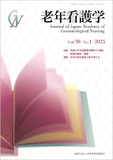Japanese
English
- 販売していません
- Abstract 文献概要
- 参考文献 Reference
抄録
本研究の目的は,認知症高齢者の低活動型せん妄への看護実践を明らかにすることである.認知症看護認定看護師(以下,DCN)6人を対象に半構造化面接を行い質的記述的に分析した.その結果,DCNは,認知症高齢者の【活気と反応の乏しさからなにか起こっていると疑う】と,【なにが起こっているのか模索する】ことや【低活動型せん妄かどうかを確かめる】ことで【特徴的な経過の変動から低活動型せん妄と判断する】ことを行っていた.また,低活動型せん妄と判断がつかない段階から,【日光や触れる刺激で目覚めを促す】ことや【過負荷に注意しながら感覚刺激を増やして覚醒を促す】ことを行い,【覚醒を維持できるように働きかける】ことを行っていた.DCNは,認知症高齢者に対してていねいな観察と探索を繰り返し,意識レベルの段階に合わせて,方法を変えながら感覚刺激を行っていた.これらの実践は,認知症高齢者の低活動型せん妄の見逃し予防につながり,意識レベルの段階に合わせた適切な意識や認知機能障害改善となっていたと考えられた.
This study aimed to identify nursing practice for hypoactive delirium in older adults with dementia. Semi-structured interviews were conducted with six nurses certified in dementia nursing (DCN) and analyzed qualitatively and descriptively. The result was that the DCNs were [suspecting that something is going on due to lack of activity and response], [searching around to know what was going on], and [screening possibility of hypoactive delirium], then [identifying hypoactive delirium based on characteristic daily changes]. In addition, from the stage when hypoactive delirium could not be identified, [promoting to wake the patient up with sunlight or touching stimulation] and [promoting wakefulness by increasing sensory simulation while being careful not to overload] were used to [supporting patient to maintain wakefulness]. The DCNs repeatedly performed careful observation and exploration of the older adults with dementia and provided sensory stimulation using different methods according to their level of consciousness. These practices were thought to prevent the older adults with dementia from overlooking hypoactive delirium and to improve their awareness and cognitive impairment according to their level of consciousness.
Copyright © 2025, Japan Academy of Gerontological Nursing All rights reserved.


